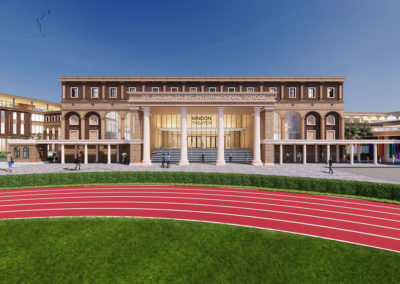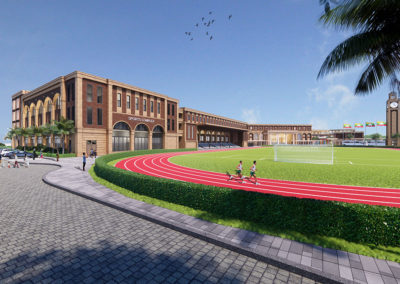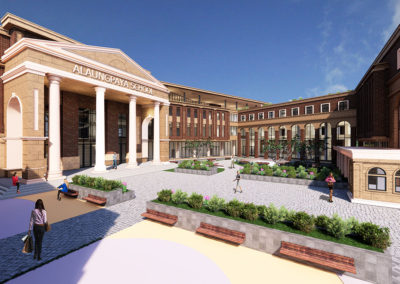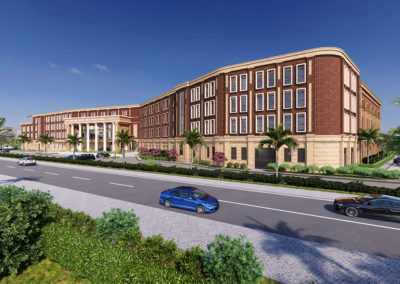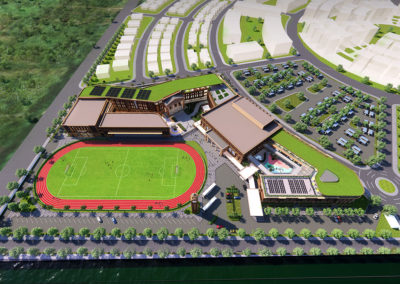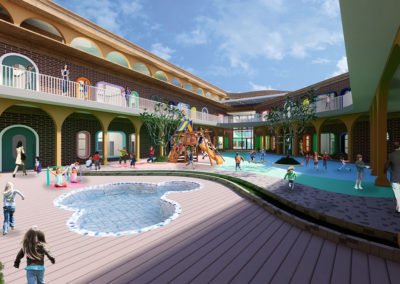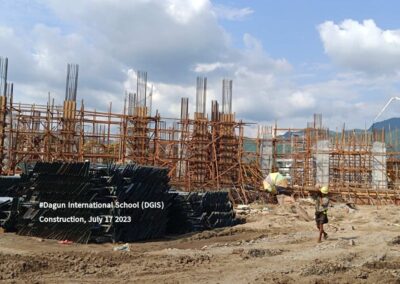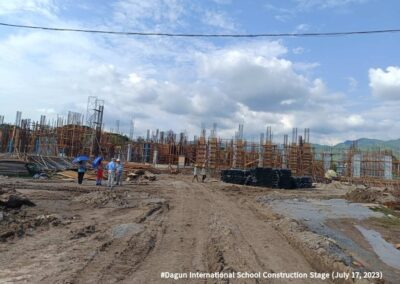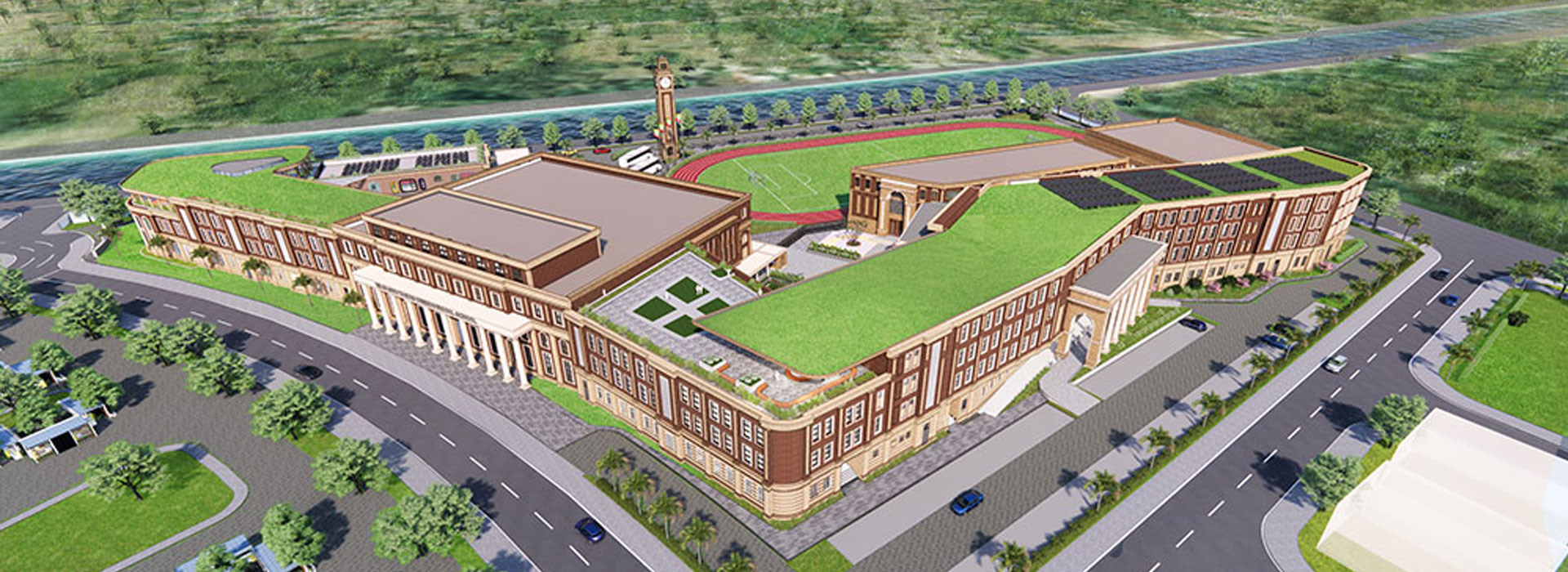
International School
| Name | Dagun International School (DGIS) |
| Land Area | 9.47 Acres |
| No. of Storey | 4 |
| Total No. of Pupils | 2000 |
DAGUN INTERNATIONAL SCHOOL (DGIS) is part of Yé Dagun Taung City Development Programs being implemented by Phwint Phyo Thit Company. The Urban Development Programs are known as Ye-Dagun-Taung Smart City Project and composed of five programs – 1) International School, 2) International Hospital, 3) Golf-Course and Clubhouse, and Amusement Park, 4) 3-star Hotel & 5-star Hotel, 5) Real Estate – community residence and shopping mall.
DAGUN INTERNATIONAL SCHOOL (DGIS) is being constructed on 9.47 acres and composed of five main buildings – (1) Main School, (2) Bleacher Building, (3) Kindergarten (KG), (4) Theater, and (5) Sports Complex. The school can hold about 2000 students. The school is designed into classic buildings by the Archetype Group based in France.
For co-curricular activities, the school has (1) a football pitch, (2) an indoor swimming pool, (3) an indoor multi-purpose stadium in the Sports Complex, (4) Visual Arts and Performing Arts facilities in the Theater building, (5) the rooftop garden, (6) the KG outdoor swimming pool and outdoor playground, and more. The school sets its target to open in August 2025.
About the Purpose of Education
When thinking about the purpose of education, besides the obvious, i.e. for children to learn how to read, write, and create to gain knowledge in various fields, there is a lot more to the role of educators.
“Intelligence plus character – that is the goal of true education.” (Dr. Martin Luther King Jr)
We believe that the purpose of education is to equip students with the knowledge, skills, and attitudes that they need to become valuable assets to our global community. We train students to be able to use the knowledge and skills acquired in a given context today to solve problems in different contexts and circumstances tomorrow.
As the world is now a global community, we practice students to be culturally and emotionally intelligent. That will enable them to productively collaborate with peers from any part of the world to solve problems and make a positive impact at the local, city, country, and global levels.
At DGIS these practical, skillful and creative lessons will be included in the curriculum, standards, and practices that will be used from kindergarten to high school. In our future posts, we will be sharing with you how we will make that happen.
Our Curriculum
DAGUN INTERNATIONAL SCHOOL (DGIS) is an IB Diploma candidate since 2019 and will apply for authorization to offer three IB educational programs – (1) IB PYP, (2) IB MYP, and (3) IB DP. The International Baccalaureate Organization was officially established in Geneva, Switzerland in 1968. At present, the IB programmes are taught in over 5,000 schools across 153 different countries.
The aim of IB programmes is to
(1) develop inquiring, knowledgeable and caring young people with adaptable skills to tackle society’s complex challenges,
(2) nurture the students to become the ones who will help to make it a better, more peaceful world,
(3) focus on each student as a whole person and address not only cognitive development but social, emotional and physical well-being,
(4) emphasize learning how to learn and teaching students to value learning as an essential, integral part of their everyday lives.
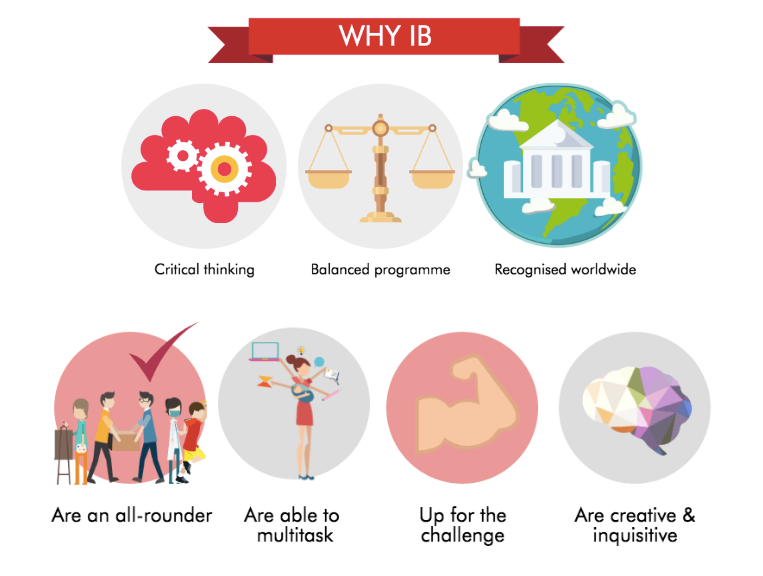
Why the IB is different
When thinking about the purpose of education, besides the obvious, i.e. for children to learn how to read, write, and create to gain knowledge in various fields, there is a lot more to the role of educators.
“Intelligence plus character – that is the goal of true education.” (Dr. Martin Luther King Jr)
We believe that the purpose of education is to equip students with the knowledge, skills, and attitudes that they need to become valuable assets to our global community. We train students to be able to use the knowledge and skills acquired in a given context today to solve problems in different contexts and circumstances tomorrow.
As the world is now a global community, we practice students to be culturally and emotionally intelligent. That will enable them to productively collaborate with peers from any part of the world to solve problems and make a positive impact at the local, city, country, and global levels.
At DGIS these practical, skillful and creative lessons will be included in the curriculum, standards, and practices that will be used from kindergarten to high school. In our future posts, we will be sharing with you how we will make that happen.
Soft skills – why they matter
As educators, our goal is to equip students with the knowledge, skills, and attitude that they need to become valuable assets to our global community. It is important that the curriculum be comprehensive and include languages, social studies, sciences, mathematics, arts, and physical and health education. In addition to that, students must be equipped with soft skills that will enable them to thrive at university, at work, in their personal lives, and in their respective communities. To that effect, IB education puts an emphasis on soft skills such as self-management skills (including organization skills), social skills, thinking skills (including creative and critical thinking), communication skills, and research skills (including media literacy). The beauty of it is that the teaching of those skills is a mandatory part of unit planning and classroom teaching by all teachers. At DGIS, all our teachers will undergo relevant IB training. The academic leaders will make sure that soft skills are taught in a consistent way in all subjects and in all grade levels.
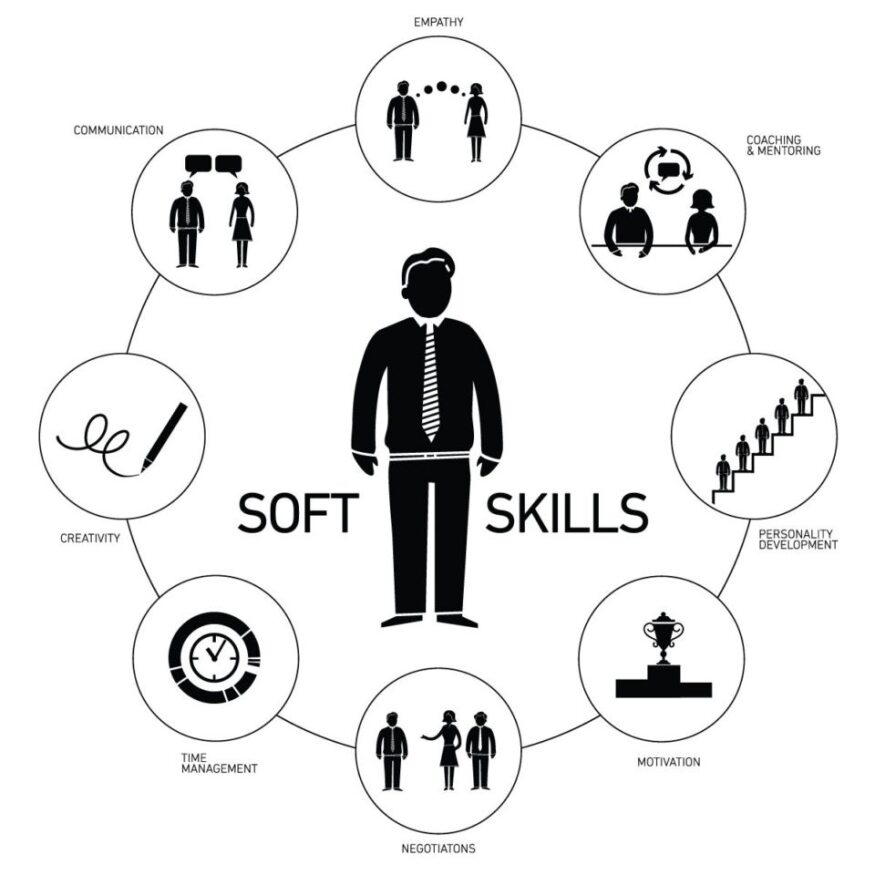
The IB’s programmes in Dagun International School (DGIS)
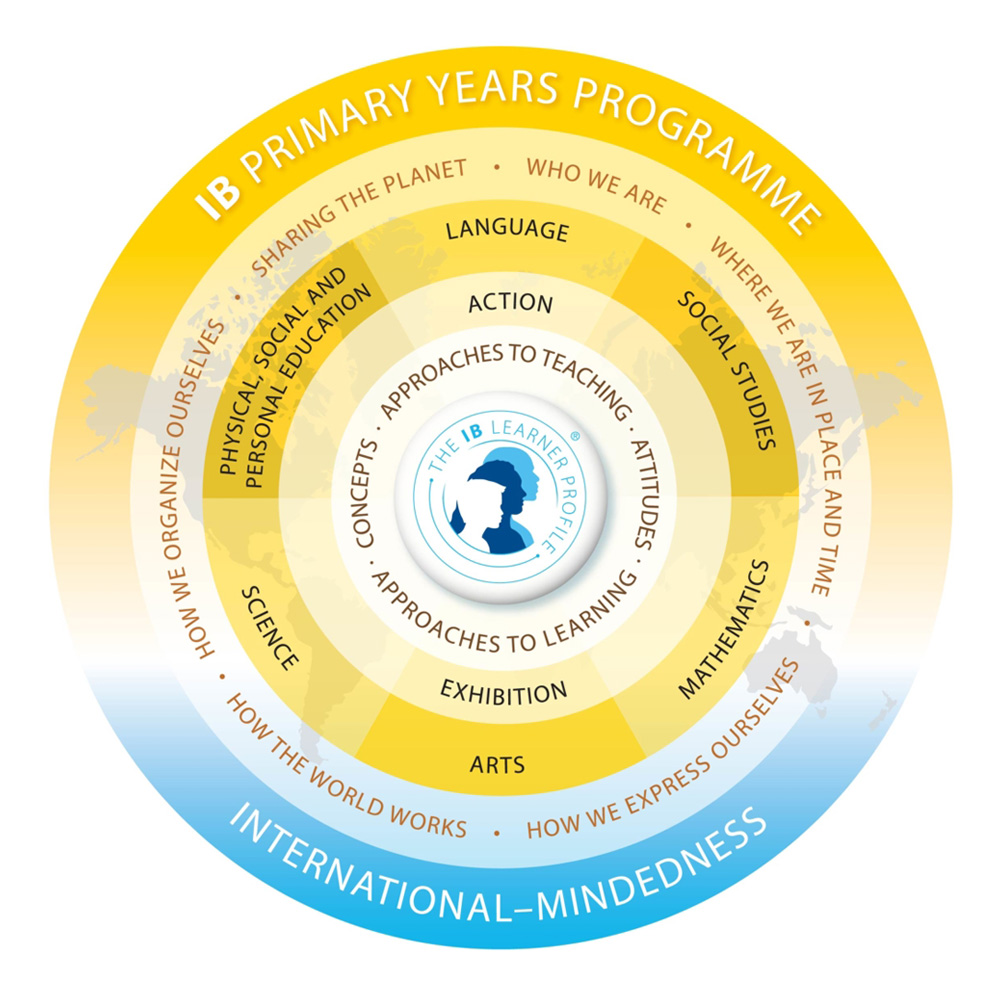
In the Primary Years Programme (PYP), for children aged 3-12, the IB’s youngest students learn about and use knowledge, concepts and skills from a variety of subjects.
The Middle Years Programme (MYP), for children aged 11-16, is a challenging framework that encourages students to make practical connections between their studies and the real world and culminates in a personal project.
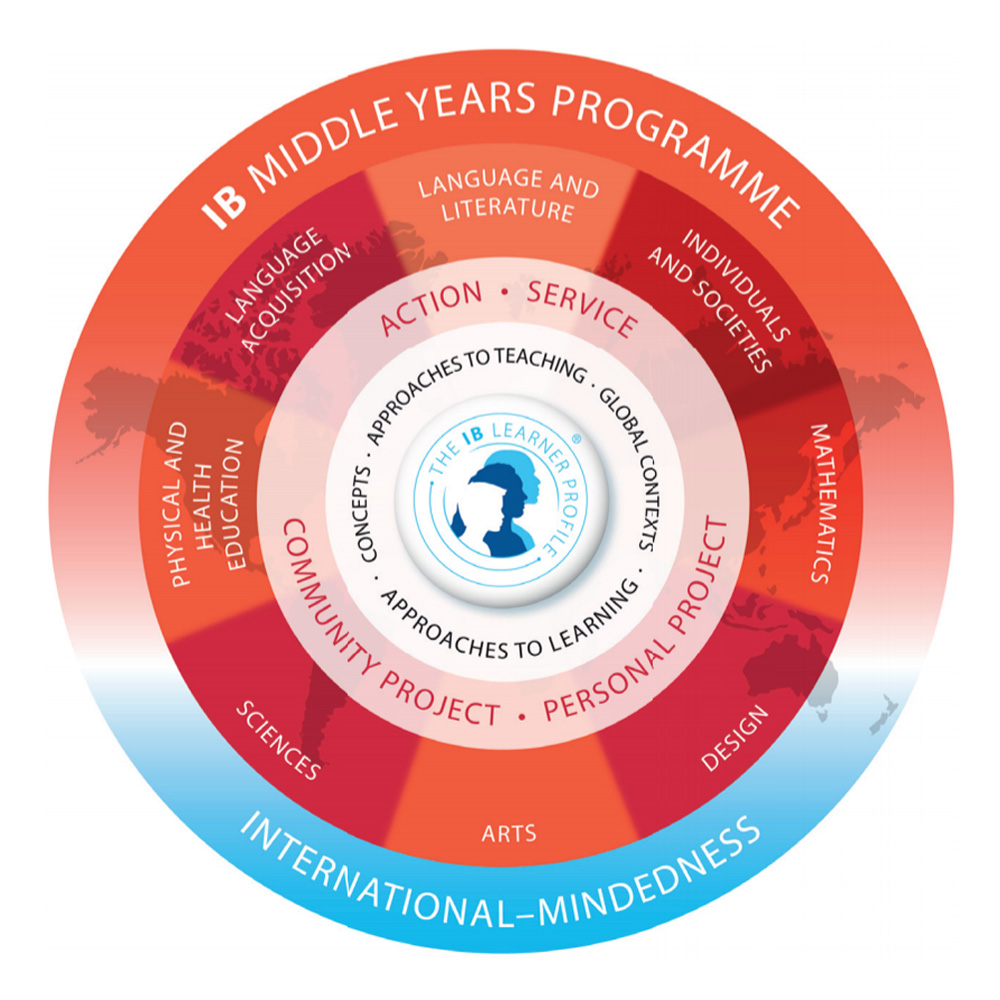

The Diploma Programme (DP), for students aged 16-19, is a curriculum which emphasizes both breadth and depth of knowledge. The DP is made up of six subject groups and a core, comprising theory of knowledge (TOK), creativity, activity, service (CAS) and a research paper of up to 4,000 words, the extended essay (EE).
Progress of Dagun International School (DGIS) construction in August, 2023
Contact
Phwint Phyo Thit (Office 1)
Sin Phyu Kan Golf Range, Corner of Theikpan & 78th Streets, Chanmyathazi Township, Mandalay, Myanmar.
Phwint Phyo Thit (Office 2)
Yé Dagun Taung Golf Club, Patheingyi Township, Mandalay, Myanmar.
sales@phwintphyothit.com
+959 778 778 877

